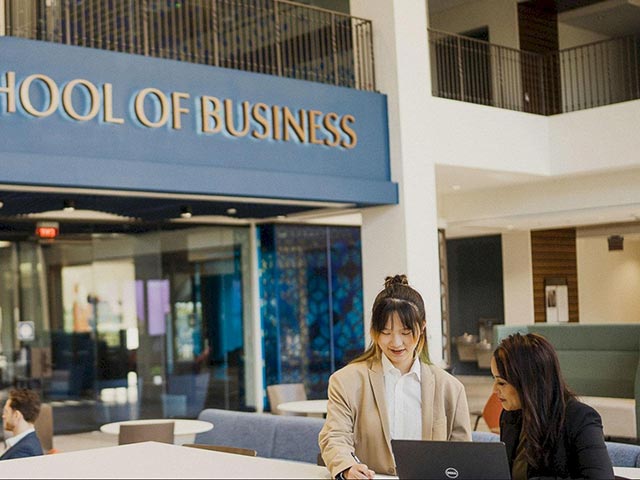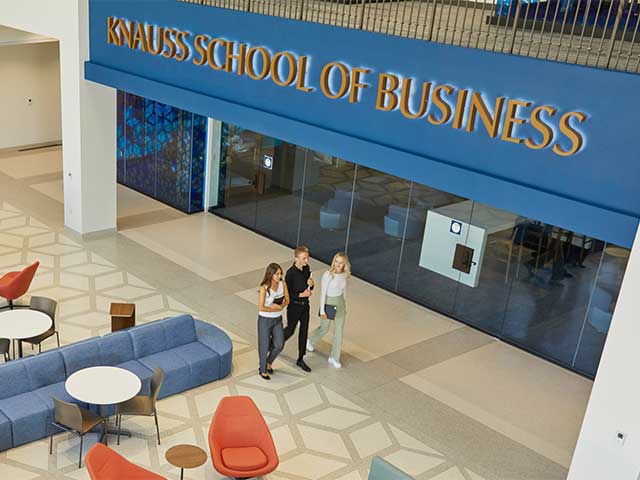There is no single business career that drives industry and connects international economies quite like supply chain management. It’s linked to critical operations at every level of production and forms the backbone of the global economy. By choosing to enter supply chain management, you can create a transformative impact and influence business for good on a global scale.
There is no single business career that drives industry and connects international economies quite like supply chain management. It’s linked to critical operations at every level of production and forms the backbone of the global economy. By choosing to enter supply chain management, you can create a transformative impact and influence business for good on a global scale.
What is Supply Chain Management?
Supply chain management is the planning, execution and monitoring of the flow of products or services. It involves coordinating and optimizing the various processes, from procurement and production to transportation and distribution. Supply chain managers specialize in efficiency, cost-effectiveness and ethical procurement from the origin of raw materials to the end consumer.
How has Supply Chain Management Evolved?
Supply chains have evolved from simple manufacturer-retailer relationships to complex global networks. Historically, supply chains consisted of linear structures focused on the efficient movement of goods from production to consumption. Globalization has revealed new markets and increased opportunities for businesses to source materials, manufacture products and sell goods internationally. Supply chains have expanded across borders, leading to the development of elaborate global networks of suppliers, manufacturers, distributors and retailers.
The combination of globalization and technological advancements has reshaped modern supply chain management. Technologies like automation, artificial intelligence, big data analytics and the Internet of Things have enabled more dynamic collaboration across supply chain partners. These advancements have sped up the flow of goods and allowed organizations to respond quickly to market trends and disruptions.
CHALLENGES FACING GLOBAL SUPPLY CHAIN
MANAGEMENT
Supply Chain Resilience
Building supply chains capable of quickly adapting to disruptions is crucial. A McKinsey survey found that 83% of supply chain leaders believe their resilience measures have minimized the impact of disruptions.
Source: mckinsey.com
Limited Visibility
A lack of end-to-end visibility hampers an organization's ability to identify issues and optimize processes. Approximately 69% of companies do not have total visibility over their supply chains.
Source: financesonline.com
Port Congestion
Congestion at ports leads to delays, increased lead times, and added costs. In the US, 33% of shipments don’t arrive on time due to congested ports.
Source: gocomet.com
Need for Sustainability and Transparency
Environmental sustainability and ethical practices are increasingly important. The MIT Center for Transportation & Logistics reports that 65% of firms do not have a net-zero carbon emissions goal.
Source: mitsloan.mit.edu
Supply Chain Resilience
Building supply chains capable of quickly adapting to disruptions is crucial. A McKinsey survey found that 83% of supply chain leaders believe their resilience measures have minimized the impact of disruptions.
Source: mckinsey.com
Limited Visibility
A lack of end-to-end visibility hampers an organization's ability to identify issues and optimize processes. Approximately 69% of companies do not have total visibility over their supply chains.
Source: financesonline.com
Port Congestion
Congestion at ports leads to delays, increased lead times, and added costs. In the US, 33% of shipments don’t arrive on time due to congested ports.
Source: gocomet.com
Need for Sustainability and Transparency
Environmental sustainability and ethical practices are increasingly important. The MIT Center for Transportation & Logistics reports that 65% of firms do not have a net-zero carbon emissions goal.
Source: mitsloan.mit.edu
All of these challenges create an urgent need for ethically-minded, innovative leaders in supply chain management.
Emerging technologies are continuing to transform supply chains from manufacturing to distribution. Businesses can stay ahead of market trends and continue to optimize processes using technologies and such as:
AI (Artificial Intelligence)
Complex AI algorithms allow businesses to analyze data, automate processes and make predictions for more accurate demand forecasting, inventory optimization and predictive maintenance.
The Internet of Things (IoT)
The interconnected device network provided by IoT gives businesses access to real-time asset tracking, condition monitoring and operational visibility.
Digital Twins
Digital twins are virtual replicas of physical assets, processes or systems, used in supply chains for simulation, predictive analysis and performance optimization.
Blockchain
Blockchain is a decentralized and secure digital ledger for recording transactions and data across a network. It allows businesses to implement transparent and secure tracking of products.
Autonomous Vehicles and Drones
Unmanned vehicles that can operate without direct human intervention enable business to utilize automated transportation, warehouse operations and last-mile delivery.
3D Printing
3D printing has simplified a multitude of production and prototyping processes by allowing for on-demand manufacturing straight from digital models.
Current and future supply chain professionals should also understand the following strategies and trends and how to maximize their potential:
Globalization
Globalization has allowed supply chains to access new markets, source materials globally and collaborate with international partners to drive efficiency and growth.
Supply Chain Risk Management
Businesses can proactively address supply chain vulnerabilities by identifying, assessing and mitigating potential risks.
Big Data
Big data refers to large volumes of structured and unstructured data that can be analyzed to reveal patterns, trends and associations.
While all of these developments are making waves by streamlining supply chain operations, there is an increasing reliance on big data analytics for predictive modeling and decision-making in logistics. By utilizing big data for demand forecasting, real-time analytics and optimization of operations, companies can develop more efficient and effective supply chain strategies.
As mentioned above, businesses are looking toward sustainability across the supply chain. From ethical sourcing to reducing the carbon footprint, standout business strategy begins with a sustainable model that reduces environmental impact and prioritizes fair labor.
As emerging technologies reshape the future of supply chains, they also open new paths—and pose new challenges—for building more sustainable, responsible operations worldwide.
SUSTAINABLE SUPPLY CHAIN MANAGEMENT
Businesses both large and small are adopting green practices as they look toward the future. The future of supply chain management is already characterized by eco-friendly practices and ethical sourcing. These companies have prioritized sustainable supply chain initiatives throughout their processes.
As companies continue to move toward sustainable supply chain practices, professionals who can bring insight and innovation into good practices throughout the supply chain will be in demand.
The supply chain management job market is active and growing, making it an excellent career choice for those with a passion for logistics and operations. A U.S. supply chain management salary averages around $98,570, and professionals with a graduate degree make about $10,000+ more than those with a bachelor’s degree. Logisticians are projected to see 28% job growth by 2031, and 21% of supply chain professionals seeking more pay last year found a new job.
Different fields and sectors of supply chain management have different roles, each with its own nuances and demands. Here are a few common jobs in supply chain management and their expectations.
Scroll
Job Title |
Average Salary |
Description |
|---|---|---|
Demand planner |
$78,400 | Analyzes market demand data, creates forecasts, collaborates with sales and marketing teams to align projections with business goals, and optimizes inventory levels. |
Master Scheduler |
$81,500 | Develops and maintains production schedules and coordinates with different departments to ensure timely manufacture of goods. |
Logistics manager |
$100,000 | Coordinates the transportation, distribution, and warehousing of products, manages inventory levels and ensures timely delivery to customers. |
Procurement manager |
$104,000 | Sources and purchases goods and services for the organization, negotiates contracts with suppliers and promotes cost-effective procurement processes. |
Materials manager |
$110,300 | Responsible for the procurement, storage, and distribution of materials, manages supplier relationships and ensures efficient material flow. |
Supply chain director |
$145,000 | Leads and manages the overall supply chain strategy, sets goals, collaborates with internal and external stakeholders, and drives continuous improvement initiatives. |
The Knauss School of Business at the University of San Diego is driven toward Business for Good. Our programs equip students with ethically-minded strategies and practical experiences to prepare them for a strong career in business. Knauss School offers a variety of graduate programs to help you build your future in supply chain management.
MS
MS in Supply Chain Management
Offers business professionals advanced expertise in strategy, cost management, and negotiations. This hybrid program combines flexible online learning with four on-campus visits.
MBA
Concentration in Supply Chain
Builds on the nationally ranked Knauss MBA with a focus on procurement, logistics, and information systems. The program is offered in Full-Time, Part-Time, and Flex modalities.
MBA-MS
MBA-MS in Supply Chain Management Dual Degree
Combines a world-class MBA with specialized supply chain expertise. With Full-Time or Part-Time MBA options and hybrid MSSCM courses, this program allows you to earn two graduate degrees in as little as 2.5 years.
SUPPLY CHAIN MANAGEMENT INSTITUTE
Supply chain management students can also take advantage of the Supply Chain Management Institute (SCMI) at Knauss School. The SCMI supports the advancement of students’ supply chain knowledge and helps build valuable industry skills while diving deep into supply chain topics.
WHAT TO LOOK FOR IN A GOOD BUSINESS SCHOOL
Knauss School boasts the most beautiful campus in the U.S. as ranked by The Princeton Review, but our real impact is in our:
-
Small class sizes
-
Diverse network
At Knauss School of Business, we know that your degree program is what sets you up for your future. Finding a good business school means looking for high-caliber faculty, advanced accreditation, strong business partnerships and a good location.
ADVANTAGES OF STUDYING SUPPLY CHAIN IN SAN DIEGO
Location: Pacific rim and international border
Knauss School is situated in San Diego, a key gateway to the Pacific Rim and an international border, providing a unique global business perspective.
Defense/military zone
San Diego serves as a strategic hub for military and national defense, offering valuable opportunities for business connections in defense-related industries.
Large tech and life sciences industry
The city is a thriving center for technology and life sciences, positioning students at the heart of innovation and industry growth.
Scroll
| Degree | MSSCM | MBA | MBA-MSSCM |
|---|---|---|---|
Who It’s For |
Working supply chain professionals | Working professionals or full-time students | Working professionals or full-time students |
Duration |
22 mo | 17-24 mo | 2.5-4 yrs |
Required experience |
2 yrs, preferably in supply chain industry | Full-Time: None (2 yrs preferred) Part-Time & Flex: 2 yrs | 2 yrs, preferably in supply chain industry |
Price |
$59,070* | $80,550* | $107,400* |
Location |
Hybrid: online courses with 4 campus visits | Choice of on-campus, online or hybrid | Combination of on-campus, online & hybrid |
* Price is estimated based on 2026-27 tuition rates and are subject to change each year.
SUPPLY CHAIN MANAGEMENT CERTIFICATE OPPORTUNITY
If you are a private employer interested in expanding your employee’s supply chain knowledge and experience, Knauss School offers a unique Supply Chain Management Certificate. If you see yourself as a potential candidate for this certificate, talk to your employer about getting enrolled.
COMPARING USD’S SUPPLY
CHAIN PROGRAMS
Toggle the tabs below to discover our supply chain-focused graduate programs:
Knauss School’s Master of Science in Supply Chain Management program is a graduate degree for business professionals seeking advanced education in supply chain strategy and design, strategic cost management, negotiations and more.
The hybrid modality allows you to learn at your own pace without affecting your career. While most course content is web-based, you can connect with classmates and faculty during 4 campus visits.
- Part-Time & Hybrid (online courses with 4 campus visits + fly free)
Access to an expansive alumni network and biannual USD supply chain conferences
2 Tracks to choose from (General and Healthcare)
Company visits to Viasat, Qualcomm, Solar Turbines and more
22 months
Annual supply chain career fair
Consulting projects with real companies
Our Master’s in Supply Chain Management’s core curriculum prepares students to think about environmental and social responsibility as the catalyst for proactive policy formation and world-class supply chain performance. It features supply chain courses like International Negotiations (MSCM 505), Strategic Cost Management (MSCM 512) and Project Management Principles (MSCM 531).
USD’s MSSCM program also offers a specialized health care track, complete with courses in EMR systems, health information management, and health care leadership. The health care industry has unique supply chain challenges, including the need for quick and efficient delivery of medical supplies, managing complex regulations and navigating the ethical implications of supply chain decisions.

Learn more
ABOUT THE MSSCM PROGRAM IN OUR CURRICULUM GUIDE
The supply chain management graduate program at Knauss School allows students to learn from renowned faculty like Simon Croom, PhD, a highly cited expert in supply chain management. Under his leadership, USD’s MSSCM program has been elevated to national recognition. Professor Croom's extensive industry experience in supply chain management, sustainable operations and world class strategy make him a valuable mentor for aspiring supply chain professionals.
Knauss School’s MBA in Supply Chain Management augments the nationally-ranked Knauss MBA with a concentration in supply chain management. The program integrates three key legs, procurement, logistics and information systems and includes access to the resources of the Supply Chain Management Institute.
The Knauss MBA offers three modalities, ranging from 17-24 months in length. Part-Time and Flex MBA courses are designed for working professionals, while our Full-Time MBA is designed for those who want to focus on school and don’t plan on working full-time during the program.
- Full-Time, Part-Time (evening classes) or Flex (weekend classes)
17-24 months
Consulting projects with real companies
Access to an expansive alumni network
Annual supply chain career fair
Supply Chain Management concentration allows for honing a specific set of skills
The Supply Chain Management concentration focuses on the design, development and management of supply relationships to ensure a smooth flow of quality goods, services and technology and optimize end customer satisfaction. Students take supply chain courses like Supply Chain Strategy and Design (GSBA 560), Strategic Cost Management (GSBA 562) and Logistics and Distribution Management (GSBA 565).
By choosing the MBA in Supply Chain Management concentration, you could study from experienced faculty like Yen-Ting (Daniel) Lin, PhD. Professor Lin specializes in competitive supply chain dynamics, pricing strategies and environmentally responsible operations. His research on eco-friendly labels, government regulations and blockchain technology offers valuable insights for students.
Knauss School’s MBA-MS in Supply Chain Management Dual Degree offers a world-class MBA education while maximizing the specialized potential of an MSSCM. MBA classes can be taken Full-Time or Part-Time, while the MSSCM courses are Hybrid. Depending on your choice of modality, the program offers 2 acclaimed graduate business degrees in as little as 2.5 years.
- Two degrees in one program
60 total units to complete (MBA - 31, MSSCM - 29)
MBA classes can be completed in full-time or part-time format
MSSCM classes are a hybrid blend of online and on-campus classes
2.5-4 year completion timeline
Consulting projects with real companies
Access to an expansive alumni network
Supply Chain Management concentration allows for honing a specific set of skills
This dual degree program is for professionals who aspire to be well-versed in all aspects of the business and develop expertise in supply chain and operations. Students take a combination of MBA and MSSCM courses, such as Operations Management (MSCM 504), Sustainable Global Supply Chain Management (MSCM 514), Law, Policy and Ethics in Global Business (GSBA 508) and a choice of real-world consulting project, International Consulting Project (GSBA 593) or Business Consulting (GSBA 595).
MBA-MSSCM students study from renowned business faculty like Ruixia (Sandy) Shi, PhD. Professor Shi is Chair of the Supply Chain, Operations and Information Systems department. With years of expertise in supply chain management, service operations and business analytics, Dr. Shi's research has been published in prestigious academic journals. Her diverse contributions to the field, spanning from academia to industry experience, make her a valuable resource for students in the MBA-MSSCM program.
As the future of supply chain management takes shape, so does the importance of ethical and efficient leaders in supply chain operations. With the advent of new supply chain technologies and the move toward globalization, careers in supply chain management will only grow in importance.
Every complex challenge in the supply chain management field comes with a new opportunity to impact business for good.
Knauss School of Business prepares students for real impact in supply chain management careers. Pursuing supply chain management at Knauss School will give you transformative potential for your current career and future opportunities. Here we believe in Business for Good, to fully prepare students interested in ethical and sustainable supply chain management and place them in the right spot for a thriving career.
Take the step towards your supply chain management degree and join the next wave of supply chain professionals at Knauss School of Business.








![[USD-KSB] Supply Chain PP](https://businessresources.sandiego.edu/hs-fs/hubfs/%5BUSD-KSB%5D%20Supply%20Chain%20PP.png?width=264&height=165&name=%5BUSD-KSB%5D%20Supply%20Chain%20PP.png)















